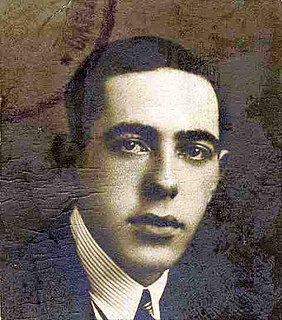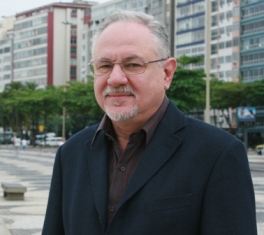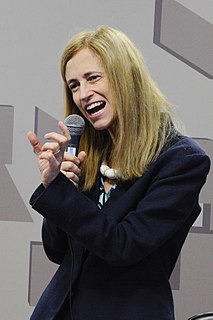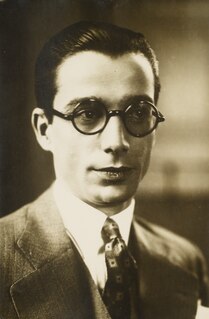
Otto Maria Carpeaux, born Otto Karpfen, was an Austrian-born Brazilian literary critic and multilingual scholar.

José Bonifácio de Andrada e Silva was a Brazilian statesman, naturalist, mineralist, professor and poet, born in Santos, São Paulo, then part of the Portuguese Empire. He was one of the most important mentors of Brazilian independence, and his actions were decisive for the success of Emperor Pedro I. He supported public education, was an abolitionist and suggested that a new national capital be created in Brazil's underdeveloped interior. His career as naturalist was marked by the discovery of four new minerals.
The Prêmio José Reis de Divulgação Científica is an annual honor awarded by the Brazilian Council of Scientific and Technological Development (CNPq) to the institution, media organization, publication, or individual who most contributed to the dissemination and public awareness of science and technology in Brazil. It is thus named in honor of Dr. José Reis, a Brazilian biologist and science writer who was one of the pioneers in the field.

Bernardo Sorj is a Brazilian social scientist, retired professor of Sociology at the Federal University of Rio de Janeiro. He is Director of The Edelstein Center for Social Research and of the Plataforma Democrática Project. He has published 30 books and more than 100 articles, on Latin American political development, international relations, the social impact of new technologies, social theory and Judaism.

The Gustavo Capanema Palace, also known architecturally as the Ministry of Education and Health Building, is a government office building in the Centro district of Rio de Janeiro, Brazil. As the first modernist project in Brazil, it is historically important to the architectural development of Modernism in Brazil and has been placed on Brazil's UNESCO tentative list.

Fundação Getulio Vargas is a Brazilian higher education institution and think tank founded on December 20, 1944, with a mission "To stimulate Brazil’s socioeconomic development". Its initial objective was to prepare qualified people to work in public and private administration in Brazil.

Marcelo Caetano Moraes is a writer, professor and pianist from Brazil., critic, journalist.

Boris Fausto is a Brazilian historian, political scientist and writer.

Luiz Carlos Bresser-Pereira is a Brazilian economist and social scientist. He teaches at the Getulio Vargas Foundation, in São Paulo. Since 1981, he has edited the Brazilian Journal of Political Economy.
This is a timeline of Brazilian history, comprising important legal and territorial changes and political events in Brazil and its predecessor states. To read about the background to these events, see History of Brazil.

Cláudia Maria Costin is a Brazilian academic and civil servant.

Paul Israel Singer was an Austrian-born Brazilian economist and scholar.

Mary Lucy Murray Del Priore is a Brazilian historian and teacher. She wrote several books on the history of everyday Brazilian people during the colonial, imperial and Republican periods.

Sul-Rio-Grandense Federal Institute of Education, Science and Technology is a Brazilian federal public institution, linked to the Ministry of Education, which composes a Federal Network of Professional, Scientific and Technological Education. It is a multicenter institution, based on the combination of sets of teaching and communication modules in its different forms of teaching, based on the combination of sets of sessions and their respective technological processes.

Fernando de Magalhães Papaterra Limongi is a Brazilian political scientist who was a member of the Department of Political Science in the Faculty of Philosophy, Literature and Social Sciences at the University of São Paulo (USP) from 1986 until 2018, and is now a professor in the São Paulo School of Economics at the Fundação Getúlio Vargas.

Anísio Spínola Teixeira was a Brazilian educator, jurist, and writer. Teixeira was one of the reformers of Brazilian education of the early 20th century, being an advocate of progressive education in the country. He was one of the co-founders of the University of the Federal District, in 1935, and of the University of Brasília in 1960.

Mário Xavier de Andrade Pedrosa was a Brazilian art and literary critic, journalist and political activist.
João Camilo de Oliveira Torres was a Brazilian writer, professor, historian and journalist.
Nicolau Sevcenko was a Brazilian historian, university professor, columnist, writer, and translator.













